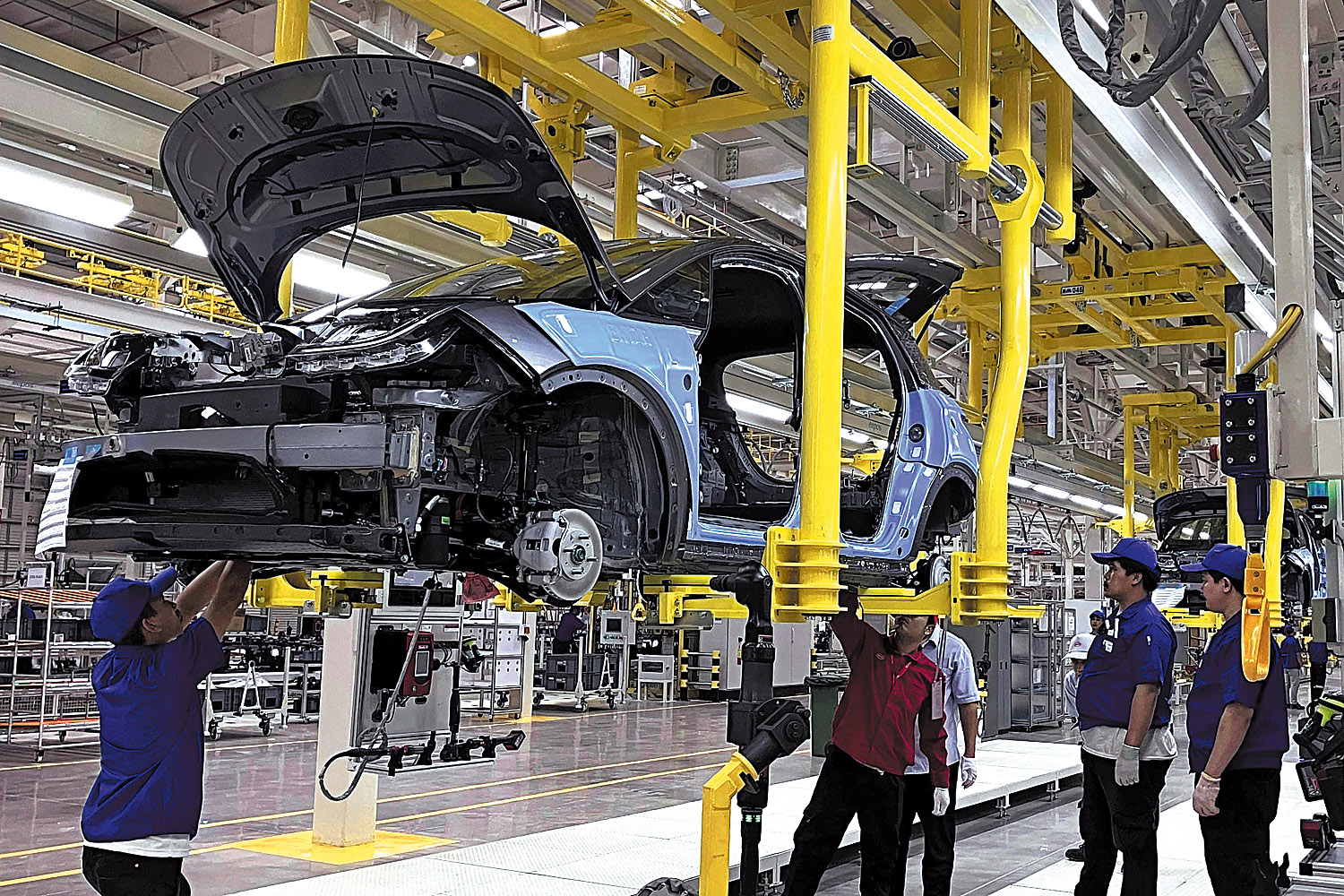Major players invest in production and supply chains to fuel regional growth

China's biggest carmakers are accelerating their push into Southeast Asia, tapping into the region's booming demand while expanding their manufacturing and sales networks to strengthen their global presence.
BYD, a major new energy vehicle maker, opened its first Southeast Asian factory in Thailand in July. It said the region is experiencing rapid growth in demand for new energy vehicles as consumers are paying more attention to environmental sustainability and economic efficiency.
The Thai plant's car making operations cover stamping, painting, welding, final assembly and producing car components. It is projected to generate 10,000 jobs.
"We hope that the establishment of the Thailand factory will allow us to respond more swiftly to market demands across ASEAN countries, thereby facilitating the advancement of the transformation and upgrade of the region's new energy industry, and fostering the growth of the new energy vehicle sector," BYD told China Daily.
READ MORE: BYD on track for global success
Southeast Asia, represented by the 10-member Association of Southeast Asian Nations, plays a key role in the global car market.
With a combined population of more than 660 million, the region exhibited significant variation in vehicle ownership rates per 1,000 individuals in 2022.
Brunei led with 605 vehicles per 1,000 people, while Malaysia followed with 533 per 1,000, according to the Invest in ASEAN website. In contrast, countries such as the Philippines, Indonesia and Vietnam reported fewer than 100 per 1,000.
As one of the pioneering Chinese automotive enterprises going overseas, Great Wall Motor, or GWM, also chose Southeast Asia as a pivotal location in its globalization strategy.
"As the world's sixth-largest automobile market, Southeast Asia has huge potential for consumer demand, with projected vehicle sales reaching 4 million units by 2050," said Yang Weiqi, general manager of right-hand drive market at GWM.
"The penetration rate of new energy vehicles remains below 10 percent, presenting significant opportunities."
GWM has been working to set up smart factories and knocked-down factories across Southeast Asia. Knocked-down factories are those where vehicles are assembled from parts.
Besides bringing key component enterprises to the local market to enhance the automotive supply chain, GWM also collaborates with local suppliers to enhance supply chain resilience.
In Thailand, the localization rate of components for GWM has exceeded 50 percent, according to the company.
In January last year, the first GWM Ora 03 Property Edition — also known as the GWM Ora Good Cat — rolled off the production line at GWM's factory in Thailand.
This marked the first instance of a Chinese original equipment manufacturer mass-producing an electric vehicle outside China.
In Malaysia, Geely Auto — a subsidiary of Zhejiang Geely Holding Group — has partnered with local conglomerate DRB-Hicom since 2017 to develop Malaysian national carmaker Proton into the No 1 brand in the country.
Having secured Proton the second position in Malaysian sales and market share for six consecutive years, Geely is now working with DRB-Hicom to build an Automotive Hi-Tech Valley.
"The high-tech valley project in Malaysia holds significant strategic importance as it aims to establish a high-tech smart industrial park that caters to the global market by integrating vehicle production and component suppliers," a Geely spokesperson said.
By 2035, the project is expected to achieve an annual production capacity of 500,000 units, with 50 percent designated for export, the company said.
Geely also aims to build a supply chain ecosystem capable of producing 1 million component sets, half of which will serve the global market.
"Geely will continue to deepen its presence in the ASEAN market, advancing its business in Malaysia, the Philippines, Myanmar, Laos, Cambodia, Thailand and other regional markets, steadily expanding its regional influence," the company said.
Tailored products
Meanwhile, BYD said it plans to establish production bases and sales networks in more countries in the region while introducing a diverse range of new energy vehicle products tailored to the consumer demand of each country.
"We will strengthen cooperation with local governments and businesses to promote the adoption and development of new energy vehicles across Southeast Asia, contributing to global green mobility," BYD said.
Nearly 500 robots are deployed in BYD's welding workshop, achieving a 100 percent automation rate for spot and stud welding.
Automation levels in other processes also exceed 70 percent, with the exhaust treatment efficiency increased to 95 percent by using robots, water-based paints and advanced treatment systems, the company said.
ALSO READ: Report: China, ASEAN most appealing in Asia for foreign investments
GWM's Yang said the company will introduce more advanced technologies and vehicles to the region, particularly focusing on new energy vehicle models and the application of smart technology.
"We will prioritize the development of a comprehensive local supply chain by building an integrated new energy ecosystem that spans production, sales and after-sales services."
By promoting green mobility solutions, Chinese carmakers said they are not only helping the transformation of Southeast Asia's automotive industry but also supporting the region's sustainable development.
Contact the writers at kelly@chinadailyapac.com


